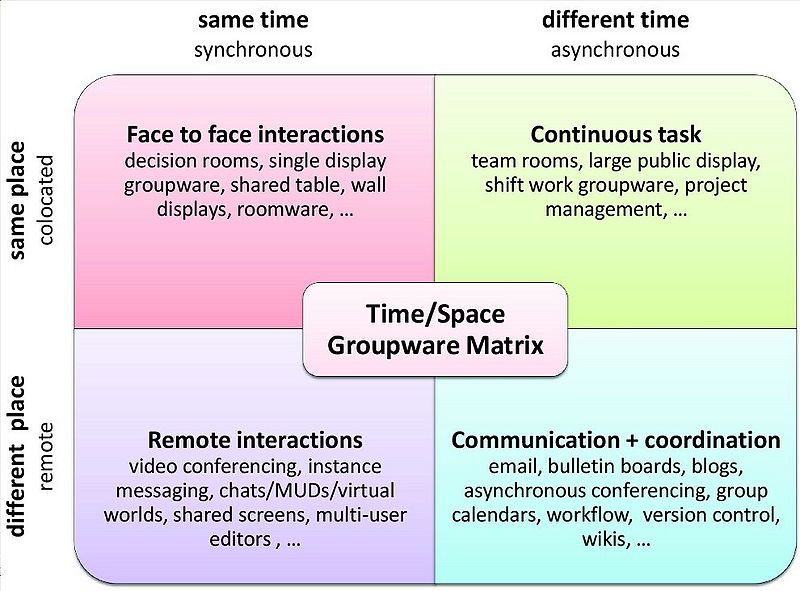Computer-supported cooperative work: Difference between revisions
Jump to navigation
Jump to search
m (using an external editor) |
m (using an external editor) |
||
| Line 4: | Line 4: | ||
{{quotationbox | The term computer supported cooperative work (CSCW) was first coined by Irene Greif and Cashman in 1984, at a workshop attended by individuals interested in using technology to support people in their work (Grudin 1994). According to Carstensen and Schmidt (2002), CSCW addresses "how collaborative activities and their coordination can be supported by means of computer systems." On the one hand, many authors consider that CSCW and groupware are synonyms. On the other hand, different authors claim that while groupware refers to real computer-based systems, CSCW focuses on the study of tools and techniques of groupware as well as their psychological, social, and organizational effects.}} ([[Wikipedia:Computer supported cooperative work]] retrieved 18:49, 12 June 2006 (MEST)) | {{quotationbox | The term computer supported cooperative work (CSCW) was first coined by Irene Greif and Cashman in 1984, at a workshop attended by individuals interested in using technology to support people in their work (Grudin 1994). According to Carstensen and Schmidt (2002), CSCW addresses "how collaborative activities and their coordination can be supported by means of computer systems." On the one hand, many authors consider that CSCW and groupware are synonyms. On the other hand, different authors claim that while groupware refers to real computer-based systems, CSCW focuses on the study of tools and techniques of groupware as well as their psychological, social, and organizational effects.}} ([[Wikipedia:Computer supported cooperative work]] retrieved 18:49, 12 June 2006 (MEST)) | ||
See also: [[CSCL]] (Computer-supported collaborative learning) and [[groupware]] | |||
== Typology of CSCW software == | == Typology of CSCW software == | ||
[[image:cscwmatrix.jpg|thumb|800px|none|CSCW Matrix from Wikipedia, the free encyclopedia, Copyright: public domain]] | [[image:cscwmatrix.jpg|thumb|800px|none|CSCW Matrix from Wikipedia, the free encyclopedia, Copyright: public domain]] | ||
== Links == | == Links == | ||
* http://www.telekooperation.de/cscw/cscw.html | * http://www.telekooperation.de/cscw/cscw.html | ||
* http://en.wikipedia.org/wiki/CSCW | * http://en.wikipedia.org/wiki/CSCW (includes a good list of essential articles to read) | ||
== References == | == References == | ||
Revision as of 15:12, 15 November 2007
CSCW is the use of computers in cooperative, coordinated and collaborative work groups under various conditions of task , time and space
The term computer supported cooperative work (CSCW) was first coined by Irene Greif and Cashman in 1984, at a workshop attended by individuals interested in using technology to support people in their work (Grudin 1994). According to Carstensen and Schmidt (2002), CSCW addresses "how collaborative activities and their coordination can be supported by means of computer systems." On the one hand, many authors consider that CSCW and groupware are synonyms. On the other hand, different authors claim that while groupware refers to real computer-based systems, CSCW focuses on the study of tools and techniques of groupware as well as their psychological, social, and organizational effects.
(Wikipedia:Computer supported cooperative work retrieved 18:49, 12 June 2006 (MEST))
See also: CSCL (Computer-supported collaborative learning) and groupware
Typology of CSCW software
Links
- http://www.telekooperation.de/cscw/cscw.html
- http://en.wikipedia.org/wiki/CSCW (includes a good list of essential articles to read)
References
- Baecker, R.M.; Others, (1995). Readings in human-computer interaction: toward the year 2000. Morgan Kaufmann Publishers.
- Grudin, J. (1994). "Computer-Supported Cooperative Work: Its History and Participation". Computer 27 (4): 19-26.
- Jacovi, M.; Soroka, V.; Gilboa-freedman, G.; Ur, S.; Shahar, E.; Marmasse, N. (2006). "The chasms of CSCW: a citation graph analysis of the CSCW conference". Proceedings of the 2006 20th anniversary conference on Computer supported cooperative work: 289-298, ACM Press New York, NY, USA. Abstract
